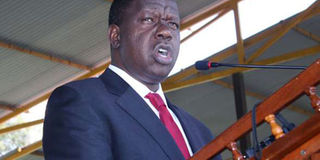Matiang’i stands out because he offers long-lost hope to Kenyans

Education Cabinet Secretary Fred Matiang'i speaks at a graduation ceremony at Kenya Technical Trainers College on July 27, 2016. He has reformed the sector. PHOTO | ANTHONY OMUYA | NATION MEDIA GROUP
What you need to know:
- Indeed, hope — although an intangible factor — is the reason President John Pombe Magufuli of Tanzania has had such an impact in that county.
- Dr Matiang’i put up a spirited fight for the return of the national fibre optic backbone infrastructure.
Sometimes I feel that we are falling over ourselves celebrating Education Cabinet Secretary Fred Matiang’i for the wrong reasons.
In my view, the reason Dr Matiang'i has captured the imagination of Kenyans is because his stewardship of the ministry has given us hope.
You can argue with the substance of some of the actions and decisions he has made, but the most significant thing is that he has given us hope by showing that we still have leaders and public officials who regard the positions they hold as giving them an opportunity to make a difference in the lives of fellow citizens.
Dr Matiang’i has demonstrated that there are still public officials who have the courage to push fundamental reforms even when such changes are against the interests of the strong and powerful.
Indeed, hope — although an intangible factor — is the reason President John Pombe Magufuli of Tanzania has had such an impact in that county, especially in terms of mobilising public support around some of his key reforms.
In Kenya, public life is dominated by self-centred leaders, whose minds are glued on their personal prospects and careers, and who shamelessly look at the rest of us as mere vote banks, not human beings interested in non-partisan guidance.
AT ICT MINISTRY
Since independence, education has catalysed fundamental changes in our society.
It is the main driver of social mobility for disadvantaged children.
Yet we all stood by as the foundations of education were gradually eroded by a rising tide of mediocrity and corruption.
Our leadership values have degenerated to such levels that, while it needs no courage to do the wrong thing, it needs a lot more courage to do the right thing.
If only we had more Cabinet secretaries and public officials with Dr Matiang’i’s mindset.
The minister’s first appointment to the Cabinet was in the Ministry of Information, Communications and Technology.
Even there, he made noises that made the movers and shakers of that sector uncomfortable.
His pet subject was the designation of some as dominant players and consequently subjecting them to tariff regulation.
He talked about forcing interconnection tariffs down by following an established glide path and fining mobile phone companies found to have breached consumer protection issues on such parameters as call drops and voice quality.
He found himself on the wrong side of politically influential speculators known for making money from hoarding and squatting on radio spectrum, which they lease to players for huge profits.
Radio spectrum is a finite public asset that should be given transparently to investors.
Indeed, spectrum give-aways to the politically-connected and opaque dealings in the allocation of frequencies is one of the most controversial issues in the telecommunications sector today.
NATIONAL DEBATE
Dr Matiang’i put up a spirited fight for the return of the national fibre optic backbone infrastructure — better known by the acronym Nofbi – to the government from Telkom Kenya.
Telkom, which managed the network that was built with taxpayer money, was tottering towards insolvency.
Dr Matiang’i argued that the government needed to move urgently to rescue national infrastructure built and owned by the taxpayer.
In October 2014, Dr Matiang’i fired off a letter to President Uhuru Kenyatta, seeking his intervention in the matter.
It did not happen because his argument, although in line with the country’s long-term planned growth and development of the ICT sector, was against the interests of the movers and shakers in Kenya.
Is a Cabinet composed of unelected technocrats parachuted into the public sector ostensibly to inject private sector discipline better placed to implement reforms than one composed of politicians, who are always under pressure to account to their voters?
When you look at the present Cabinet in terms of ability of the State to coax compliant behaviour from the public, do you see any equivalent of John Michuki?
How about the capacity of the Kenya Revenue Authority?
Why do I get this feeling that the taxman demonstrated stronger capacity under Michael Waweru?
In the New Year, we need to start an extensive, nationwide discussion about the ability of the State to implement planned projects.





